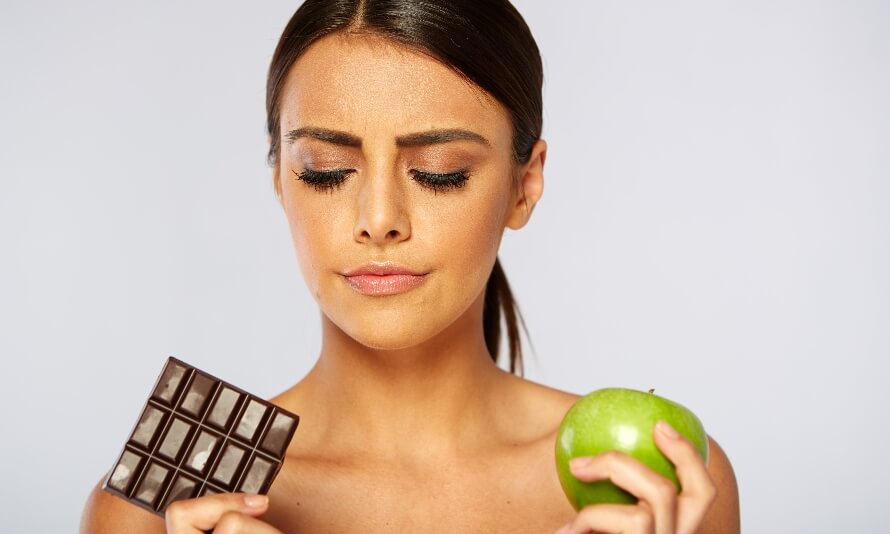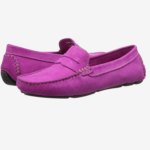Synthetic sweeteners appear to be a godsend for losing a few pounds.
Earlier than their invention, the one approach to fulfill your candy tooth was to eat sugar, sweet, soda, and different calorie-containing confections.
Due to the creation of synthetic sweeteners like acesulfame potassium, aspartame, and sucralose, although, you will get your saccharine repair with out the energy (and thus drop extra pounds extra simply).
That’s the concept, anyway, however some individuals declare that synthetic sweeteners not directly stymie weight reduction by making you crave sweets. As an alternative of satisfying, they are saying, synthetic sweeteners create an itch that may solely be scratched by consuming sugary, calorie-rich meals.
Who’s proper?
On this article you’ll study what synthetic sweeteners are, the names of the six synthetic sweeteners which were accredited by the FDA, and whether or not or not synthetic sweeteners make us crave actual sugar or not.
What Are Synthetic Sweeteners?
Synthetic sweeteners, often known as “sugar substitutes” or “high-intensity sweeteners,” are chemical substances which might be added to meals to make it style candy and sometimes have few or no energy.
Due to their chemical make-up, synthetic sweeteners are far sweeter than desk sugar (as much as 20,000 occasions sweeter) which suggests you solely want to make use of a really small quantity to attain an identical degree of sweetness as sugar.
Synthetic sweeteners will be categorized into two classes: Nutritive and non-nutritive sweeteners. Nutritive sweeteners include energy, whereas non-nutritive sweeteners include few or no energy.
Meals that generally include synthetic sweeteners are:
- Baked items
- Sweet
- Canned meals
- Cereals
- Dairy merchandise
- Powdered dietary dietary supplements
- Puddings
- Salad dressings
- Sauces
- Comfortable drinks
- Chewing gum
Accredited Synthetic Sweeteners Listing
The names of the six synthetic sweeteners which were approved by the Meals and Drug Administration (FDA) are:
- Advantame: Advantame is roughly 20,000 occasions sweeter than sugar and comprises no energy.
- Acesulfame potassium: Acesulfame potassium is included on ingredient lists as acesulfame Okay, acesulfame potassium, or Ace-Okay, and is bought below the model names Sunett and Candy One. It’s round 200 occasions sweeter than sugar, comprises no energy, and is commonly mixed with different sweeteners.
- Aspartame: Aspartame model names embrace Nutrasweet, Equal, and Sugar Twin. It’s about 200 occasions sweeter than sugar and comprises 4 energy per gram.
- Neotame: Neotame is bought below the model identify Newtame, is 7,000-to-13,000 occasions sweeter than sugar, and comprises no energy.
- Saccharin: Saccharin model names embrace Candy and Low, Candy Twin, Candy’N Low, and Necta Candy. It’s 200-to-700 occasions sweeter than sugar and comprises no energy.
- Sucralose: Sucralose is bought below the model identify Splenda, is about 600 occasions sweeter than sugar, and comprises no energy.
Discover the Finest Eating regimen for You in Simply 60 Seconds
What number of energy must you eat? What about “macros?” What meals must you eat? Take our 60-second quiz to get science-based solutions to those questions and extra.
Take the Quiz
Do Synthetic Sweeteners Make You Crave Sweets?
As a result of synthetic sweeteners include few to no energy, many individuals assume that they’re a savvy approach to sate your style buds with out derailing your weight loss plan.
And whereas this may be true (a number of studies show that individuals lose extra weight after they substitute sugary fare with artificially sweetened options), there’s some proof that consuming synthetic sweeteners too usually could make you crave calorie-rich sweets.
To clarify why this is perhaps the case, we should begin with a spot of evolutionary biology.
As a result of candy meals are typically a wonderful supply of power for our our bodies, we developed a “reward system” that makes us take pleasure in consuming them.
This reward system known as the mesolimbic dopamine system, and it works by releasing a burst of the hormone dopamine into our our bodies at any time when we eat sugar. This dopamine makes the expertise pleasurable, and tells us that we must always do it once more as a result of it’s essential for our survival.
Nevertheless, analysis reveals that synthetic sweeteners don’t activate our reward system in the identical manner that sugar does as a result of they don’t deliver the healthy dose of power (energy) the physique expects from one thing so candy.
Because of this at any time when we eat meals or drinks sweetened by synthetic sweeteners, our brains are tricked into pondering that we need to consume extra energy (usually from calorie-dense, sugary meals) to fulfill our power calls for.
A salient instance of this comes from a study carried out by scientists on the College of Southern California wherein 74 individuals attended three experimental periods: one after they consumed an artificially-sweetened drink, one the place they consumed a sugar-sweetened drink, and one the place they drank water.
After consuming every drink, the individuals checked out footage of high-calorie meals whereas the researchers used useful MRI (fMRI) scans to measure exercise within the components of the mind related to urge for food and meals cravings. The researchers additionally measured the individuals’ blood sugar, insulin, and metabolic hormone ranges.
On the finish of every session, the researchers gave the individuals entry to a buffet and recorded how a lot every participant ate.
The outcomes confirmed that . . .
- Consuming artificially sweetened drinks elevated exercise in areas of the mind related to urge for food and cravings greater than consuming a sugar-sweetened drink did, notably in feminine and overweight individuals.
- Ranges of metabolic hormones that inform your physique you’re full decreased after consuming an artificially sweetened drink in contrast with a sugar-sweetened drink.
- Consuming an artificially sweetened drink elevated the quantity ladies (however not males) ate on the buffet.
What’s extra, research shows that frequently consuming sweets could enhance the mind’s tolerance to sweetness, and strengthen your desire for candy meals. In accordance with this principle, whereas consuming sweet-tasting meals could fulfill your cravings within the short-term, it magnifies them in the long run.
Thus, you’ll be able to see why many individuals consider that consuming synthetic sweeteners could encourage you to eat extra of the true McCoy.
Nevertheless, no evaluation of the analysis can be full with out trying on the counterarguments—and sadly for the artificial-sweeteners-cause-cravings crowd, their principle has some holes.
For instance, several studies show that consuming synthetic sweeteners doesn’t make you eat extra energy later, nor does it make you search sugary, calorie-dense meals. One study specifically discovered that ingesting artificially sweetened drinks diminished cravings for desserts greater than ingesting water.
It’s additionally debatable whether or not consuming candy meals will increase your desire for candy meals. Whereas it is sensible given what we learn about how consuming salt or fat can enhance our desire for salty, fatty meals, little direct proof exists displaying the identical is true for sugar.
For example, one study carried out by scientists on the College of Bristol confirmed that the extra kids drank orangeade, the extra they loved it. Nevertheless, these findings weren’t replicated when the identical take a look at was achieved with adults.
Lastly, there are query marks over the standard of the analysis on the results of synthetic sweeteners on cravings.
Some research had been carried out utilizing animals equivalent to flies and mice, which you’ll be able to’t essentially extrapolate to people. Others are to date faraway from real-life conditions that it’s uncertain how related they’re in apply.
For example, one research had individuals drink a Sprite whereas answering questions on shampoo after which describe the packaging on a bottle of water, gum, and M&M’s. One other study had individuals odor and have a look at their favourite meals for 4 minutes whereas answering questions on their household family tree, whereas a researcher positioned a cotton swab of their mouth that was “impregnated” with the flavour of the meals they had been . Not precisely how most individuals go about their mealtimes.
So, do synthetic sweeteners make you crave sweets?
The quick reply is . . . possibly, however it’s in all probability not sufficient to make you overeat or achieve weight.
If that is one thing you’re involved about or it’s confirmed to be a problem for you previously, strive lowering or eliminating your consumption of synthetic sweeteners and see how you’re feeling. In case your cravings ebb (and this was the one factor you modified about your weight loss plan), go away synthetic sweeteners out of your weight loss plan sooner or later, and in the event that they don’t, then don’t fear about it.
And in the event you at present eat artificially sweetened meals and drinks whereas weight-reduction plan, and discover they’re a helpful “candy deal with” that helps you resist calorie-dense options, then by all means proceed (research additionally reveals this is perhaps an inexpensive technique for sticking to your weight loss plan).
FAQ #1: Are synthetic sweeteners dangerous for you?
Lots of the claims about synthetic sweeteners contributing to weight gain, diabetes, metabolic syndrome, cancer, headaches, and seizures are overblown.
Nevertheless, whereas synthetic sweeteners will not be as harmful as some individuals say, studies show that frequently consuming them could also be dangerous to our well being.
If you wish to sweeten your meals with one thing that’s low in energy, secure, and sugar-free, your greatest choices are stevia, erythritol, and luo han guo fruit extracts.
Multiple studies show that they’re not solely secure however also can confer a number of well being advantages, together with higher insulin sensitivity, a decrease ldl cholesterol profile, improved blood glucose management, potential anti-cancer results, decrease blood stress and irritation ranges, and extra.
Mainly, in the event you’re in any respect nervous in regards to the well being results of synthetic sweeteners, you’ll be able to simply sidestep any points through the use of a pure different.
FAQ #2: Synthetic Sweeteners vs. Sugar: Which is healthier?
Synthetic sweeteners and sugar aren’t inherently “dangerous,” which suggests neither is inherently “higher” than the opposite.
That mentioned, analysis on the risks of synthetic sweeteners isn’t all the time clear lower, and there are some causes to consider you must decrease the quantity of synthetic sweeteners you eat.
Sugar, then again, could be very properly studied and poses little in the way in which of a well being threat when consumed moderately.
Thus, it’s in all probability greatest to go for sugary meals over artificially sweetened meals more often than not (particularly in the event you’re consuming pure sugars present in meals like fruit ?), and preserve any artificially sweetened indulgences to a minimal.
FAQ #3: Can you purchase protein powder with out synthetic sweeteners?
Sure.
Legion’s Whey+, Casein+, and Plant+ protein powders are all naturally sweetened with stevia and erythritol.
In order for you a mouth-watering, high-protein, low-calorie protein powder that’s free from any chemical junk, strive Whey+, Casein+, or Plant+ in the present day.
Oh, and in the event you aren’t positive if Whey+, Casein+, and Plant+ are best for you or if one other complement is perhaps a greater match in your price range, circumstances, and targets, then take the Legion Complement Finder Quiz! In lower than a minute, it’ll let you know precisely what dietary supplements are best for you. Click on right here to test it out.
+ Scientific References
- Sharma, A., Amarnath, S., Thulasimani, M., & Ramaswamy, S. (2016). Artificial sweeteners as a sugar substitute: Are they really safe? Indian Journal of Pharmacology, 48(3), 237. https://doi.org/10.4103/0253-7613.182888
- Sclafani, A., & Ackroff, K. (2015). Advantame Sweetener Preference in C57BL/6J Mice and Sprague-Dawley Rats. Chemical Senses, 40(3), 181. https://doi.org/10.1093/CHEMSE/BJU070
- High-Intensity Sweeteners | FDA. (n.d.). Retrieved November 28, 2021, from https://www.fda.gov/food/food-additives-petitions/high-intensity-sweeteners
- Peters, J. C., Wyatt, H. R., Foster, G. D., Pan, Z., Wojtanowski, A. C., Vander Veur, S. S., Herring, S. J., Brill, C., & Hill, J. O. (2014). The effects of water and non-nutritive sweetened beverages on weight loss during a 12-week weight loss treatment program. Obesity (Silver Spring, Md.), 22(6), 1415–1421. https://doi.org/10.1002/OBY.20737
- Piernas, C., Tate, D. F., Wang, X., & Popkin, B. M. (2013). Does diet-beverage intake affect dietary consumption patterns? Results from the Choose Healthy Options Consciously Everyday (CHOICE) randomized clinical trial. The American Journal of Clinical Nutrition, 97(3), 604–611. https://doi.org/10.3945/AJCN.112.048405
- Raben, A., Vasilaras, T. H., Christina Møller, A., & Astrup, A. (2002). Sucrose compared with artificial sweeteners: different effects on ad libitum food intake and body weight after 10 wk of supplementation in overweight subjects. The American Journal of Clinical Nutrition, 76(4), 721–729. https://doi.org/10.1093/AJCN/76.4.721
- Stice, E., Spoor, S., Bohon, C., Veldhuizen, M. G., & Small, D. M. (2008). Relation of reward from food intake and anticipated food intake to obesity: a functional magnetic resonance imaging study. Journal of Abnormal Psychology, 117(4), 924–935. https://doi.org/10.1037/A0013600
- Westwater, M. L., Fletcher, P. C., & Ziauddeen, H. (2016). Sugar addiction: the state of the science. European Journal of Nutrition 2016 55:2, 55(2), 55–69. https://doi.org/10.1007/S00394-016-1229-6
- Davis, C., Patte, K., Levitan, R., Reid, C., Tweed, S., & Curtis, C. (2007). From motivation to behaviour: a model of reward sensitivity, overeating, and food preferences in the risk profile for obesity. Appetite, 48(1), 12–19. https://doi.org/10.1016/J.APPET.2006.05.016
- Smeets, P. A. M., De Graaf, C., Stafleu, A., Van Osch, M. J. P., & Van Der Grond, J. (2005). Functional magnetic resonance imaging of human hypothalamic responses to sweet taste and calories. The American Journal of Clinical Nutrition, 82(5), 1011–1016. https://doi.org/10.1093/AJCN/82.5.1011
- Yang, Q. (2010). Gain weight by “going diet?” Artificial sweeteners and the neurobiology of sugar cravings: Neuroscience 2010. The Yale Journal of Biology and Medicine, 83(2), 101. /pmc/articles/PMC2892765/
- Wang, Q. P., Lin, Y. Q., Zhang, L., Wilson, Y. A., Oyston, L. J., Cotterell, J., Qi, Y., Khuong, T. M., Bakhshi, N., Planchenault, Y., Browman, D. T., Lau, M. T., Cole, T. A., Wong, A. C. N., Simpson, S. J., Cole, A. R., Penninger, J. M., Herzog, H., & Neely, G. G. (2016). Sucralose Promotes Food Intake through NPY and a Neuronal Fasting Response. Cell Metabolism, 24(1), 75–90. https://doi.org/10.1016/J.CMET.2016.06.010
- Casperson, S. L., Johnson, L. A., & Roemmich, J. N. (2017). The relative reinforcing value of sweet versus savory snack foods after consumption of sugar- or non-nutritive sweetened beverages. Appetite, 112, 143–149. https://doi.org/10.1016/J.APPET.2017.01.028
- Lavin, J. H., French, S. J., & Read, N. W. (1997). The effect of sucrose- and aspartame-sweetened drinks on energy intake, hunger and food choice of female, moderately restrained eaters. International Journal of Obesity and Related Metabolic Disorders : Journal of the International Association for the Study of Obesity, 21(1), 37–42. https://doi.org/10.1038/SJ.IJO.0800360
- Hill, S. E., Prokosch, M. L., Morin, A., & Rodeheffer, C. D. (2014). The effect of non-caloric sweeteners on cognition, choice, and post-consumption satisfaction. Appetite, 83, 82–88. https://doi.org/10.1016/J.APPET.2014.08.003
- Cui, M., Jiang, P., Maillet, E., Max, M., Margolskee, R., & Osman, R. (2006). The heterodimeric sweet taste receptor has multiple potential ligand binding sites. Current Pharmaceutical Design, 12(35), 4591–4600. https://doi.org/10.2174/138161206779010350
- Yunker, A. G., Alves, J. M., Luo, S., Angelo, B., Defendis, A., Pickering, T. A., Monterosso, J. R., & Page, K. A. (2021). Obesity and Sex-Related Associations With Differential Effects of Sucralose vs Sucrose on Appetite and Reward Processing: A Randomized Crossover Trial. JAMA Network Open, 4(9). https://doi.org/10.1001/JAMANETWORKOPEN.2021.26313
- Ludwig, D. S. (2009). Artificially sweetened beverages: cause for concern. JAMA, 302(22), 2477–2478. https://doi.org/10.1001/JAMA.2009.1822
- Liem, D. G., & De Graaf, C. (2004). Sweet and sour preferences in young children and adults: role of repeated exposure. Physiology & Behavior, 83(3), 421–429. https://doi.org/10.1016/J.PHYSBEH.2004.08.028
- Blundell, J. E., & Hill, A. J. (1986). Paradoxical effects of an intense sweetener (aspartame) on appetite. Lancet (London, England), 1(8489), 1092–1093. https://doi.org/10.1016/S0140-6736(86)91352-8
- Crézé, C., Candal, L., Cros, J., Knebel, J. F., Seyssel, K., Stefanoni, N., Schneiter, P., Murray, M. M., Tappy, L., & Toepel, U. (2018). The Impact of Caloric and Non-Caloric Sweeteners on Food Intake and Brain Responses to Food: A Randomized Crossover Controlled Trial in Healthy Humans. Nutrients, 10(5). https://doi.org/10.3390/NU10050615
- Fantino, M., Fantino, A., Matray, M., & Mistretta, F. (2018). Beverages containing low energy sweeteners do not differ from water in their effects on appetite, energy intake and food choices in healthy, non-obese French adults. Appetite, 125, 557–565. https://doi.org/10.1016/J.APPET.2018.03.007
- Tey, S. L., Salleh, N. B., Henry, J., & Forde, C. G. (2017). Effects of aspartame-, monk fruit-, stevia- and sucrose-sweetened beverages on postprandial glucose, insulin and energy intake. International Journal of Obesity (2005), 41(3), 450–457. https://doi.org/10.1038/IJO.2016.225
- Rolls, B. J., Hetherington, M., & Burley, V. J. (1988). Sensory stimulation and energy density in the development of satiety. Physiology & Behavior, 44(6), 727–733. https://doi.org/10.1016/0031-9384(88)90053-4
- Rogers, P. J., & Hardman, C. A. (2015). Food reward. What it is and how to measure it. Appetite, 90, 1–15. https://doi.org/10.1016/J.APPET.2015.02.032
- Bertino, M., Beauchamp, G. K., & Engelman, K. (1982). Long-term reduction in dietary sodium alters the taste of salt. The American Journal of Clinical Nutrition, 36(6), 1134–1144. https://doi.org/10.1093/AJCN/36.6.1134
- Mattes, R. D. (1993). Fat preference and adherence to a reduced-fat diet. The American Journal of Clinical Nutrition, 57(3), 373–381. https://doi.org/10.1093/AJCN/57.3.373
- Rogers, P. J. (2018). The role of low-calorie sweeteners in the prevention and management of overweight and obesity: Evidence v. conjecture. Proceedings of the Nutrition Society, 77(3), 230–238. https://doi.org/10.1017/S0029665117004049
- Hill, S. E., Prokosch, M. L., Morin, A., & Rodeheffer, C. D. (2014). The effect of non-caloric sweeteners on cognition, choice, and post-consumption satisfaction. Appetite, 83, 82–88. https://doi.org/10.1016/J.APPET.2014.08.003
- Volkow, N. D., Wang, G. J., Fowler, J. S., Logan, J., Jayne, M., Franceschi, D., Wong, C., Gatley, S. J., Gifford, A. N., Ding, Y. S., & Pappas, N. (2002). “Nonhedonic” food motivation in humans involves dopamine in the dorsal striatum and methylphenidate amplifies this effect. Synapse (New York, N.Y.), 44(3), 175–180. https://doi.org/10.1002/SYN.10075
- Maloney, N. G., Christiansen, P., Harrold, J. A., Halford, J. C. G., & Hardman, C. A. (2019). Do low-calorie sweetened beverages help to control food cravings? Two experimental studies. Physiology & Behavior, 208. https://doi.org/10.1016/J.PHYSBEH.2019.03.019
- de la Hunty, A., Gibson, S., & Ashwell, M. (2006). A review of the effectiveness of aspartame in helping with weight control. Nutrition Bulletin, 31(2), 115–128. https://doi.org/10.1111/J.1467-3010.2006.00564.X
- Rogers, P. J., Hogenkamp, P. S., De Graaf, C., Higgs, S., Lluch, A., Ness, A. R., Penfold, C., Perry, R., Putz, P., Yeomans, M. R., & Mela, D. J. (2016). Does low-energy sweetener consumption affect energy intake and body weight? A systematic review, including meta-analyses, of the evidence from human and animal studies. International Journal of Obesity (2005), 40(3), 381. https://doi.org/10.1038/IJO.2015.177
- Ford, H. E., Peters, V., Martin, N. M., Sleeth, M. L., Ghatei, M. A., Frost, G. S., & Bloom, S. R. (2011). Effects of oral ingestion of sucralose on gut hormone response and appetite in healthy normal-weight subjects. European Journal of Clinical Nutrition, 65(4), 508–513. https://doi.org/10.1038/EJCN.2010.291
- Lutsey, P. L., Steffen, L. M., & Stevens, J. (2008). Dietary intake and the development of the metabolic syndrome: the Atherosclerosis Risk in Communities study. Circulation, 117(6), 754–761. https://doi.org/10.1161/CIRCULATIONAHA.107.716159
- Pereira, M. A., & Odegaard, A. O. (2013). Artificially sweetened beverages–do they influence cardiometabolic risk? Current Atherosclerosis Reports, 15(12). https://doi.org/10.1007/S11883-013-0375-Z
- Mishra, A., Ahmed, K., Froghi, S., & Dasgupta, P. (2015). Systematic review of the relationship between artificial sweetener consumption and cancer in humans: analysis of 599,741 participants. International Journal of Clinical Practice, 69(12), 1418–1426. https://doi.org/10.1111/IJCP.12703
- Sathyapalan, T., Thatcher, N. J., Hammersley, R., Rigby, A. S., Pechlivanis, A., Gooderham, N. J., Holmes, E., Le Roux, C. W., Atkin, S. L., & Courts, F. (2015). Aspartame sensitivity? A double blind randomised crossover study. PloS One, 10(3). https://doi.org/10.1371/JOURNAL.PONE.0116212
- Shaywitz, B. A., Anderson, G. M., Novotny, E. J., Ebersole, J. S., Sullivan, C. M., & Gillespie, S. M. (1994). Aspartame has no effect on seizures or epileptiform discharges in epileptic children. Annals of Neurology, 35(1), 98–103. https://doi.org/10.1002/ANA.410350115
- Abou-Donia, M. B., El-Masry, E. M., Abdel-Rahman, A. A., McLendon, R. E., & Schiffman, S. S. (2008). Splenda alters gut microflora and increases intestinal p-glycoprotein and cytochrome p-450 in male rats. Journal of Toxicology and Environmental Health. Part A, 71(21), 1415–1429. https://doi.org/10.1080/15287390802328630
- Qin, X. (2011). What made Canada become a country with the highest incidence of inflammatory bowel disease: Could sucralose be the culprit? Canadian Journal of Gastroenterology, 25(9), 511. https://doi.org/10.1155/2011/451036
- Yadav, S. K., & Guleria, P. (2012). Steviol glycosides from Stevia: biosynthesis pathway review and their application in foods and medicine. Critical Reviews in Food Science and Nutrition, 52(11), 988–998. https://doi.org/10.1080/10408398.2010.519447
- Shivanna, N., Naika, M., Khanum, F., & Kaul, V. K. (2013). Antioxidant, anti-diabetic and renal protective properties of Stevia rebaudiana. Journal of Diabetes and Its Complications, 27(2), 103–113. https://doi.org/10.1016/J.JDIACOMP.2012.10.001
- Ozbayer, C., Kurt, H., Kalender, S., Ozden, H., Gunes, H. V., Basaran, A., Cakmak, E. A., Civi, K., Kalender, Y., & Degirmenci, I. (2011). Effects of Stevia rebaudiana (Bertoni) extract and N-nitro-L-arginine on renal function and ultrastructure of kidney cells in experimental type 2 Diabetes. Journal of Medicinal Food, 14(10), 1215–1222. https://doi.org/10.1089/JMF.2010.0280
- Di, R., Huang, M. T., & Ho, C. T. (2011). Anti-inflammatory Activities of Mogrosides from Momordica grosvenori in Murine Macrophages and a Murine Ear Edema Model. Journal of Agricultural and Food Chemistry, 59(13), 7474–7481. https://doi.org/10.1021/JF201207M











